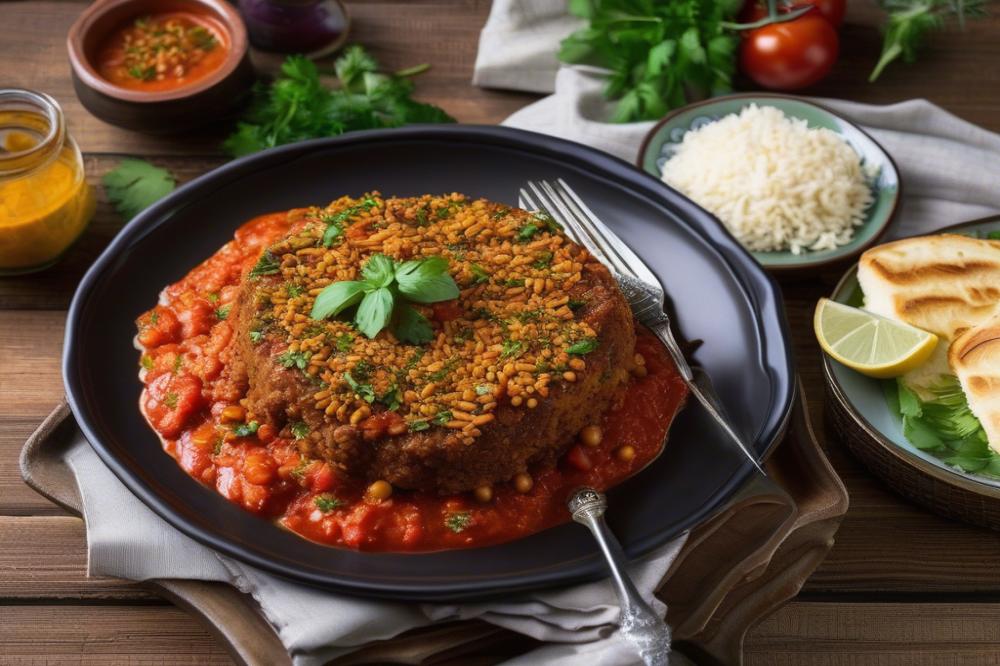Introduction
Moroccan cuisine is a marvelous blend of flavors and traditions. It reflects the rich history and cultural interactions of the Mediterranean region. Among its many offerings, eggplant holds a special place. This vegetable shines in various traditional dishes, known for their warmth and depth of flavor.
eggplant is not just tasty; it also provides numerous health benefits. Many Moroccan meals feature this vibrant vegetable, often prepared in a tagine or served as part of a meze. Vegetarian choices are abundant, making it an appealing option for many. Dishes such as Zaalouk and Baba Ghanoush highlight its versatility.
Spices and herbs play a critical role in enhancing the overall taste of these meals. Warm cumin, aromatic coriander, and spicy harissa create a delightful dance on the palate. Often, a sprinkle of fresh herbs like cilantro or parsley adds a refreshing touch. Together, these ingredients elevate simple dishes to extraordinary culinary experiences.
The purpose of this article is to explore the rich world of Moroccan eggplant dishes. Readers will discover flavorful recipes and learn how to create them in their own kitchens. Embrace the essence of Moroccan cooking and uncover the delicious possibilities within these eggplant-inspired creations.
Moroccan eggplant dishes: A Celebration of Flavor

Moroccan cuisine offers a delightful array of dishes that showcase eggplant. One popular dish is zaalouk, a warm salad made by roasting eggplant and mixing it with tomatoes, garlic, and spices. Another beloved recipe is baba ghanoush, a creamy dip that features charred eggplant blended with tahini, lemon, and garlic. These dishes reflect the rich and diverse flavors of Morocco, making eggplant an essential ingredient.
Preparation of eggplant in Moroccan recipes often involves roasting or grilling. This process enhances the vegetable’s natural sweetness. After cooking, chefs often combine the eggplant with bold spices. Harissa, a spicy red chili paste, adds a kick that many enjoy. Other recipes may include a mix of Mediterranean herbs, giving the dishes a fresh profile.
Meze and Eggplant Delights
Meze plays a significant role in Moroccan dining culture. These small dishes encourage sharing and tasting. Many meze include eggplant, showcasing its versatility. From grilled to baked, each preparation offers a different experience. Spicy eggplant bites served with flatbread are a common choice. Guests enjoy sampling various meze, often complemented by olives and cheese.
The Role of Tagines
Cooking with a tagine is a cornerstone of traditional Moroccan meals. This unique clay pot allows for slow cooking, preserving flavors and moisture. Eggplant dishes thrive in this environment, absorbing spices beautifully. A tagine filled with layered vegetables and meat creates a hearty, healthy meal. Vegetarian options abound, showcasing eggplant alongside chickpeas and seasonal vegetables.
Each bite of these meals is a journey through flavors and textures. The combination of spicy harissa, tender eggplant, and other fresh ingredients creates a memorable dining experience. Moroccan food lovers can attest to the richness of these traditional dishes. Enjoying these eggplant recipes is a true celebration of Moroccan culture.
Classic Moroccan Eggplant Recipe

Ingredients List
- 2 medium eggplants
- 2 tablespoons olive oil
- 1 onion, finely chopped
- 3 cloves garlic, minced
- 1 red bell pepper, diced
- 2 tomatoes, chopped
- 1 teaspoon ground cumin
- 1 teaspoon paprika
- 1 teaspoon harissa (or more for spiciness)
- Salt and pepper to taste
- Fresh parsley for garnish
Nutritional Information per serving
Calories: 200
Fat content: 10g
Protein: 5g
Carbohydrates: 25g
Fiber: 8g
Vitamins and minerals: Rich in Vitamin A, C, and potassium
Cooking Instructions
- Start by preheating your oven to 375°F (190°C).
- Cut the eggplants in half lengthwise. Score the flesh with a knife in a crosshatch pattern. Drizzle olive oil over them and sprinkle with salt.
- Roast eggplants in the oven for about 30 minutes until they are tender.
- While they roast, heat a pan over medium heat. Add olive oil and sauté the onions until they become translucent.
- Mix in the minced garlic and diced red bell pepper. Cook this mixture for about five minutes.
- Add chopped tomatoes, cumin, paprika, and harissa to the pan. Let it simmer for 10 minutes while stirring occasionally.
- Once the eggplants are done, scoop out some of the flesh, mix it into the tomato mixture, then refill the eggplant halves.
- Return stuffed eggplants to the oven for an additional 10 minutes.
- Garnish with fresh parsley before serving.
Tips for Selecting Fresh Eggplants
Choose firm eggplants that feel heavy for their size. Look for smooth skin without blemishes. The color should be vibrant, typically deep purple in most varieties. Avoid any that have soft spots or wrinkles.
Suggestions for Serving and Pairing
This dish serves wonderfully on a bed of couscous or alongside traditional tagine. It can be part of a larger meze platter, offering a variety of flavors. Pair it with a refreshing salad or some warm pita bread for a Mediterranean touch.
Exploring Variations of Eggplant in Moroccan cuisine

Moroccan cuisine features eggplant in a multitude of delightful ways. Grilling, roasting, and stuffing are common preparations that showcase its versatility. Grilled eggplant gains a smoky flavor that enhances the overall taste. Roasting brings out sweetness, creating a soft, creamy texture. Stuffed eggplant allows for a combination of spices and fillings, making each bite a joyful experience.
Spices play a crucial role in shaping the flavors of eggplant dishes. Each region has its own blend of spices, adding distinct character to the meals. For instance, northwestern regions may incorporate cumin and paprika, while southern areas lean toward spicy harissa. These spices evoke a sense of warmth and richness that makes Moroccan dishes more appealing. Fresh herbs like cilantro and parsley also brighten flavors, contributing to the diversity of preparations.
Zaalouk is a popular dish that highlights eggplant’s versatility. This traditional meze combines eggplant with tomatoes, garlic, and spices, creating a delicious dip. It is often served warm or at room temperature, enjoyed with bread. Another well-loved dish is Baba Ganoush, which brings a Mediterranean twist. This creamy dip blends roasted eggplant with tahini, garlic, and lemon juice, offering a healthy option for any gathering.
Vegetarian recipes frequently include eggplant as a star ingredient. Its rich texture makes it satisfying in various dishes. Tagines often feature eggplant, cooked with an array of vegetables and spices that create a balanced and hearty meal. Many healthy options are also available, appealing to those seeking lighter fare. Eggplant is low in calories and packed with nutrients, making it a nourishing choice for anyone’s diet.
Cultural Significance of Eggplant in Moroccan Dishes
Eggplant holds a special place in Moroccan cuisine. It is a key ingredient in many traditional dishes. The vegetable is celebrated for its versatility and ability to absorb surrounding flavors. When cooked in a tagine, eggplant transforms into a hearty, spicy dish that warms the heart and soul. It can also be found in meze, where it is served alongside other small plates as part of a shared meal.
Family and communal dining traditions are central to Moroccan culture. Meals often bring people together, and eggplant dishes play an important role in these gatherings. Table settings are vibrant and full of different flavors. A large, steaming dish of eggplant with harissa can easily become the centerpiece. Sharing food fosters connections and strengthens bonds among family and friends.
The significance of seasonal ingredients cannot be overstated in Moroccan cooking. Using eggplant during its peak season enhances both flavor and nutrition. Visitors may find that dishes vary depending on when they visit. Fresh vegetables from local markets often inspire creativity in the kitchen. Healthy and vegetarian options abound, making it easy to enjoy delicious meals year-round.
As a staple in Moroccan households, eggplant showcases the rich heritage of the region. From savory stews to grilled delights, this vegetable enriches the dining experience. The combination of spices and fresh ingredients reflects a depth of flavor unique to this Mediterranean cuisine. Each bite tells a story of tradition, community, and the joy of shared meals.
Final Thoughts on a Flavorful Journey
Recapping the richness found in eggplant dishes reveals a world of flavors. Each recipe tells a story, rooted in traditions that span generations. Ingredients like spices, herbs, and fresh vegetables come together to create something truly remarkable. Savoring these dishes offers more than just a meal; it’s a celebration of Moroccan culture.
Exploring Moroccan cuisine opens the door to delightful discoveries. Many dishes feature eggplant in diverse ways, showcasing its versatility. Consider trying the spiced stews or the beloved zaalouk. Each bite transports you further into the heart of Morocco.
Eating well should bring joy and nourishment. Traditional recipes often pack in nutrients alongside bold flavors. Embracing this culinary adventure encourages a healthy lifestyle without sacrificing taste. Different cultural elements create a rich tapestry of dining experiences. Take the time to indulge in these wonderful eggplant recipes. You might find a new favorite dish, one that inspires your kitchen creativity.
In conclusion, Moroccan eggplant dishes offer a fantastic way to embrace healthy eating. These recipes invite everyone to experience the joy of cooking and sharing meals. So, dive into the world of Moroccan flavors and enjoy the journey.



